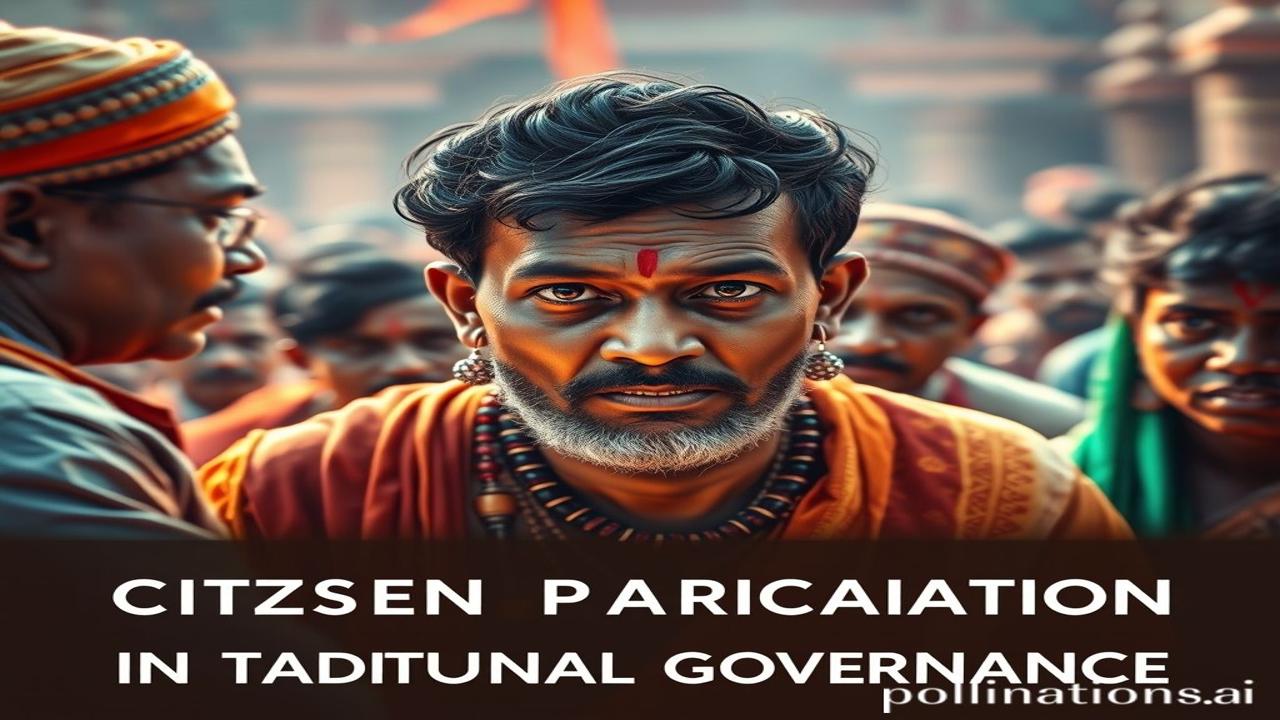Waqt Ke Panno Mein: Citizen Participation – Jab Gaon Hi Sarkar Tha! (Citizen Participation in Traditional Governance)
Kabhi socha hai, jab satellite aur internet nahi the, tab India kaise chalta tha? Imagine, deepak ki roshni mein lipti hui panchayat, jahan har ghar ki aawaz suni jaati thi. Koi Twitter trends nahi, sirf dil se dil ki baat. Waqt ki dhool mein chhipi woh kahani aaj phir se uthana zaroori hai. Aaj hum baat karenge, Citizen Participation in Traditional Governance ki – ek aisa system jo shahar ki bheed mein shayad kho gaya hai, lekin Bharat ki aatma mein aaj bhi zinda hai.
Itihas Ki Khoj: Kya Hai Traditional Governance? (Historical Context: What is Traditional Governance?)
Traditional governance, yaani paramparik shasan vyavastha, koi nayi cheez nahi hai. Yeh woh system hai jo British Raj se bhi pehle, Mughal Empire se bhi pehle, actually, Indus Valley Civilization ke time se chala aa raha hai. Think of it as a decentralised system, jahan decisions top-down nahi, bottom-up hote the.
- Kya Hai?: Basically, local communities apne issues khud solve karti thi. Panchayats, tribal councils, caste sabhas—yeh sab milkar rule karte the.
- Kab Aur Kahan?: Almost everywhere in India! Har region ka apna unique version tha. Dates ki baat karein toh, from ancient times to even recently, iske examples milte hai.
- Importance?: Kyunki yeh system logon ki zaruraton aur context ko samajhta tha. It wasn’t one-size-fits-all. Plus, it encouraged a sense of ownership and responsibility among citizens. Aaj democracy ki baat karte hai, lekin yeh toh humare blood mein hai!
Zameeni Sach: Logo Aur Jeevan (The Ground Reality: People and Life)
Imagine a small village in Rajasthan. Dhool bhari galiyan, rang birange kapde, aur har ghar ke bahar chhoti si chaupal.
“Beti Savitri, yeh paani ka vivad kab tak chalega?” Panch Sarpanch ne kaha.
Ma Savitri, unki aankhon mein thoda gussa, thoda dar, bolti hai, “Sarpanch ji, humare khet sookh rahe hai. Padosi gaon ne nadi ka rukh mod diya hai.”
Phir shuru hoti hai panchayat. Buzurg, yuva, mahila, sab apne-apne vichar rakhte hai. Koi kehta hai police ko bulao, koi kehta hai pyar se baat karo. Ant mein, ek samjhauta hota hai—a compromise that benefits both villages.
Ma Rukmini ne aaj naye kapde pehne, kyunki mandir mein utsav tha. Every event, every conflict, every celebration was a community affair. Rulers changed, empires rose and fell, but the village council remained the heart of Indian life.
Dharohar Aur Pehchan: Aaj Ka Connection (Cultural Significance Today)
Aaj bhi, many villages still rely on traditional governance systems alongside modern democratic institutions. Khaap Panchayats (though controversial) are one example, and many tribal communities continue to follow their age-old customs in decision-making.
This system reflects what we often call “Bharatiyata”—a sense of community, responsibility, and connection to the land. It’s about respecting tradition while adapting to the modern world. The core values of empathy, consensus-building, and shared prosperity are timeless.
Mazedar Tathya Ya Bhram-Bhanjak (Fun Fact or Myth-Buster)
Log samajhte hain ki panchayat sirf gaon mein hoti hai… lekin asli sach yeh hai ki shehron mein bhi, mohalle ki level par, informal panchayats hoti hai! Neighbours milkar small disputes solve karte hai—who gets the parking spot, whose kids are making too much noise. Yeh traditional governance ka hi ek roop hai!
Drishya Aur Bhavnayein: Sensing The Past (Visual & Sensory Layer)
The air smelled of woodsmoke and spices, mingled with the scent of wet earth after the monsoon rains. The temple walls felt cool and smooth under your fingertips, etched with stories of gods and heroes. The sounds of children playing, cattle bells ringing, and women singing bhajans echoed through the streets, painting a vibrant picture of rural life.
Antim Vichar Ya Uddharan (Closing Insight or Quote)
“ग्रामे ग्रामे नवं काव्यं, ग्रामे ग्रामे नवी कथा।” (Grāme grāme navaṁ kāvyaṁ, grāme grāme navī kathā) – In every village, there is a new poem, in every village, a new story.
Let’s remember the wisdom of our ancestors and strive to build a future where every voice is heard, and every community thrives. Because, at the end of the day, asli shakti to logon mein hi hai.
